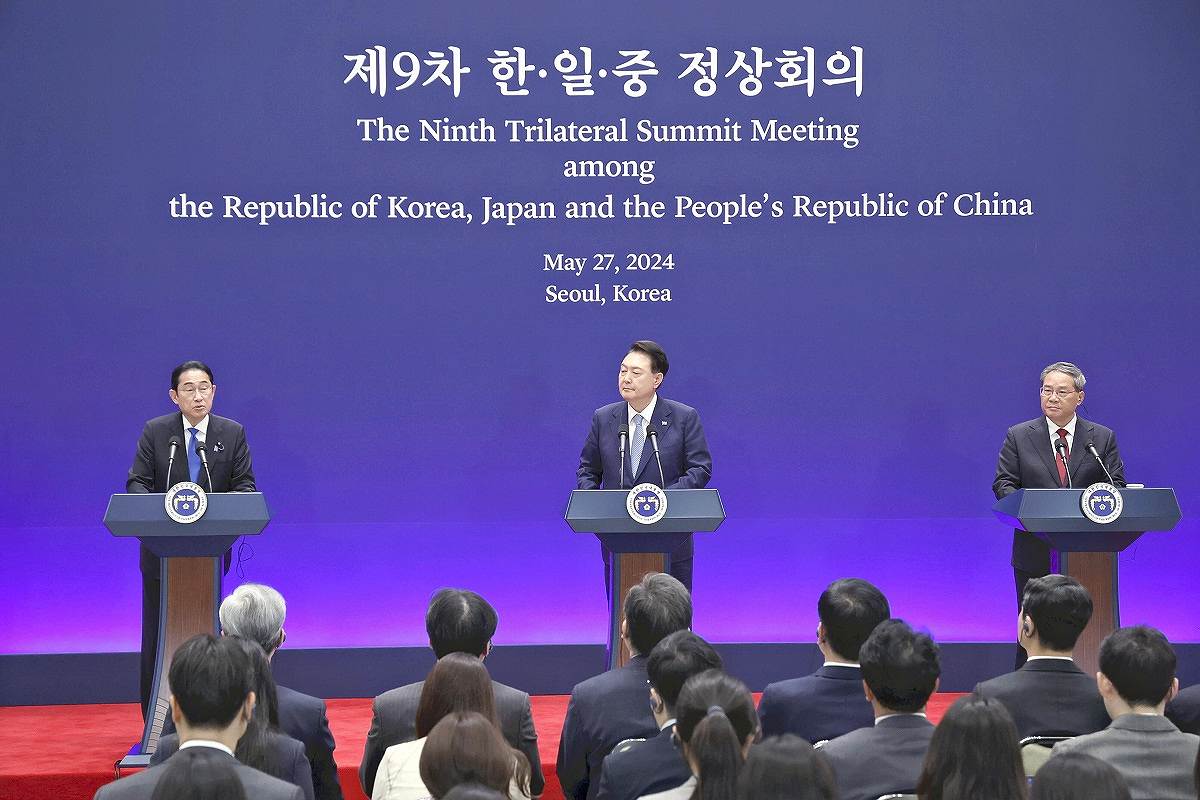Tokyo, Beijing, Seoul Agree on Need for Stable Korean Peninsula; N. Korean Satellite Criticized at Talks

Prime Minister Fumio Kishida, left, speaks at a joint press conference after a meeting with South Korean President Yoon Suk Yeol, center, and Chinese Premier Li Qiang in Seoul on Monday.
18:15 JST, May 27, 2024
SEOUL — The leaders of Japan, China and South Korea on Monday held talks and issued a joint declaration stating that stability on the Korean Peninsula is in their common interest.
Prime Minister Fumio Kishida, Chinese Premier Li Qiang and South Korean President Yoon Suk Yeol sat for the trilateral talks in Seoul on Monday morning. The last summit with the three countries was in Chengdu, China, in December 2019.
The joint declaration released following the meeting stated, “Maintaining peace, stability and prosperity on the Korean Peninsula and in Northeast Asia serves our common interest and is our common responsibility.”
Early Monday, North Korea issued a notice that it would launch a satellite, and at the start of the meeting Kishida criticized the move. He then added, “I want to reinforce communication [among the three nations] on international affairs, including the situation in North Korea, and on the strengthening of the international economic order.”
“If North Korea goes ahead with the launch regardless of warnings from the international community, then the international community must resolutely respond to the move,” said Yoon, who chaired Monday’s talks.
“The purpose of China-Japan-South Korea cooperation is to promote development to strengthen East Asian partnership and safeguard regional and global peace and prosperity,” Li said.
Regarding North Korea, which continues to develop its nuclear and missile programs, the joint declaration only states, “We reiterated positions on regional peace and stability, denuclearization of the Korean Peninsula and the abductions issue, respectively.”
The declaration also refers to the importance of “an international order based on the rule of law and international law.”
Six areas are listed for the three countries to cooperate on: people-to-people exchanges; sustainable development including through climate change response; economic cooperation and trade; public health and aging societies; science, technology and digital transformation; and disaster relief and safety.
The leaders agreed to designate 2025-2026 as “the Year of Cultural Exchange among the three countries.”
“We will promote exchanges among future generations and strive to achieve people-to-people exchanges involving 40 million people a year by 2030,” Yoon said at a joint press conference after the meeting.
The declaration also said the three countries will continue to work toward the realization of a trilateral free trade agreement, hold regular trilateral meetings, and boost cooperation.
“We must exercise and share our wisdom to expand cooperation in ways that benefit the regional and the international communities, and also to lead the international community toward collaboration rather than division and confrontation,” Kishida said at the meeting.
Japan-China-South Korea summits began in 1999 on the sidelines of summit talks related to the Association of Southeast Asian Nations. They have been held separate from other international meetings since 2008. Japan will chair the next trilateral talks.
Top Articles in Politics
-

Japan PM Takaichi’s Cabinet Resigns en Masse
-

Sanae Takaichi Elected Prime Minister of Japan; Keeps All Cabinet Appointees from Previous Term
-

Japan’s Govt to Submit Road Map for Growth Strategy in March, PM Takaichi to Announce in Upcoming Policy Speech
-

LDP Wins Historic Landslide Victory
-

LDP Wins Landslide Victory, Secures Single-party Majority; Ruling Coalition with JIP Poised to Secure Over 300 seats (UPDATE 1)
JN ACCESS RANKING
-

Producer Behind Pop Group XG Arrested for Cocaine Possession
-

Japan PM Takaichi’s Cabinet Resigns en Masse
-

Man Infected with Measles Reportedly Dined at Restaurant in Tokyo Station
-

Israeli Ambassador to Japan Speaks about Japan’s Role in the Reconstruction of Gaza
-

Videos Plagiarized, Reposted with False Subtitles Claiming ‘Ryukyu Belongs to China’; Anti-China False Information Also Posted in Japan


























